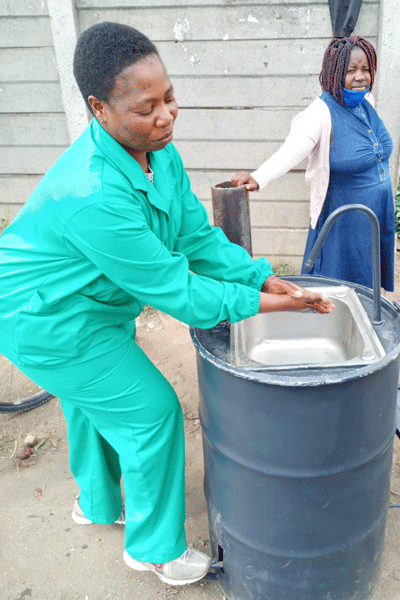
By Kennedy Nyavaya
Hundreds of farming produce merchants and customers at the Lusaka market in Highfield have applauded the recent commissioning of innovative hand-disinfecting taps at the entrance, as efforts to open up the informal sector albeit exercising strict hygiene heat up.
The Oasis 1, a hands-free pedal-powered sanitising machine made from recycled material, including 100-litre drums, is an invention by youthful organisation Boliro Consulting and could be a cheaper but effective way to assist in curbing the spread of Covid-19 at crowded spaces.
“It is really helping and people are loving it, they are happy because this is smarter than what we used to do using water from buckets, now someone can just pump sanitiser on their own without any problems,” said a general hand at the Lusaka fresh produce market.
The innovation comes at a time the number of infected people has been rising nationwide, breaching the 500-mark last week in what calls for more protective measures, among them hand sanitising.
Boliro representative Norbert Kakurisa said the ground-breaking idea came from the need to explore a more effective yet sustainable way of public sanitising “Zimbabwe is dominated by the informal sector, so the need to have the economy, schools, churches and society at large functional again prompted us to look for solutions to normalise the new normal,” said Kakurisa.
“The machine is comparatively cheap and more durable than other options and we hope it becomes a popular feature in this fight against the virus.”
According to Kakurisa, the units made at their workshop in Mbare need to be placed at all busy points in the country’s cities and at growth points. This, he said, would help deal with the country’s longstanding sanitary issues that have caused outbreaks of medieval diseases like cholera and typhoid.
- Chamisa under fire over US$120K donation
- Mavhunga puts DeMbare into Chibuku quarterfinals
- Pension funds bet on Cabora Bassa oilfields
- Councils defy govt fire tender directive
Keep Reading
“Uptake on these vital units is currently low and people tend to believe that Covid-19 is over yet there is the real risk of a second wave. Also, our units do not only work during Covid-19, but also to fight other waterborne diseases,” he said.
Since the government announced a national lockdown on March 30, managed by the country’s security forces, there has been minimal activity in city business hubs.
However, of late there has been a push for the further opening-up of the economy, which government is slowly heeding in what calls for extreme cautiousness and application of extensive sanitary methods in order to slow the spread of the virus that has claimed the lives of close to half a million people worldwide.











